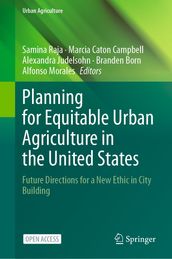
Carta PAYBACK di Mondadori
Su Mondadori Store, con la tua carta PAYBACK ti premi ad ogni acquisto.

Su Mondadori Store, con la tua carta PAYBACK ti premi ad ogni acquisto.
pubblicato da
Springer International Publishing
This open access book, building on the legacy of food systems scholar and advocate, Jerome Kaufman, examines the potential and pitfalls of planning for urban agriculture (UA) in the United States, especially in how questions of ethics and equity are addressed. The book is organized into six sections. Written by a team of scholars and practitioners, the book covers a comprehensive array of topics ranging from theory to practice of planning for equitable urban agriculture. Section 1 makes the case for re-imagining agriculture as central to urban landscapes, and unpacks why, how, and when planning should support UA, and more broadly food systems. Section 2, written by early career and seasoned scholars, provides a theoretical foundation for the book. Section 3, written by teams of scholars and community partners, examines how civic agriculture is unfolding across urban landscapes, led largely by community organizations. Section 4, written by planning practitionersand scholars, documents local government planning tied to urban agriculture, focusing especially on how they address questions of equity. Section 5 explores UA as a locus of pedagogy of equity. Section 6 places the UA movement in the US within a global context, and concludes with ideas and challenges for the future. The book concludes with a call for planning as public nurturance an approach that can be illustrated through urban agriculture. Planning as public nurturance is a value-explicit process that centers an ethics of care, especially protecting the interests of publics that are marginalized. It builds the capacity of marginalized groups to authentically co-design and participate in planning/policy processes. Such a planning approach requires that progress toward equitable outcomes is consistently evaluated through accountability measures. And, finally, such an approach requires attention to structural and institutional inequities. Addressing these four elements is more likelyto create a condition under which urban agriculture may be used as a lever in the planning and development of more just and equitable cities.
This is an open access book.
This is an open access book.


Generi Scienza e Tecnica » Agricoltura e Allevamento » Geografia » Geografia e Topografia fisica » Opere generali » Geografia umana, politica ed economica » Ingegneria e Tecnologia » Chimica industriale e tecnologie manifatturiere , Hobby e Tempo libero » Motori » Mezzi di trasporto , Economia Diritto e Lavoro » Diritto » Economia » Economia del welfare , Politica e Società » Servizi sociali e Criminologia » Assistenza sociale e servizi sociali » Criminalità organizzata » Pene, punizioni, prigioni » Studi interdisciplinari e culturali » Sociologia e Antropologia » Sociologia e Antropologia, altri titoli » Antropologia: Opere generali » Sociologia: Opere generali » Politica e Istituzioni » Diritti umani » Propaganda, controllo politico e libertà » Problemi e Processi sociali » Rifugiati e asilo politico » Ideologie e Teorie politiche » Scienza e teoria politica
Editore Springer International Publishing
Formato Ebook con Adobe DRM
Pubblicato 19/03/2024
Lingua Inglese
EAN-13 9783031320767 9783031320767
Scrivi una recensione per "Planning for Equitable Urban Agriculture in the United States"

Accedi o Registrati per aggiungere una recensione
 Torna in cima
Torna in cima







